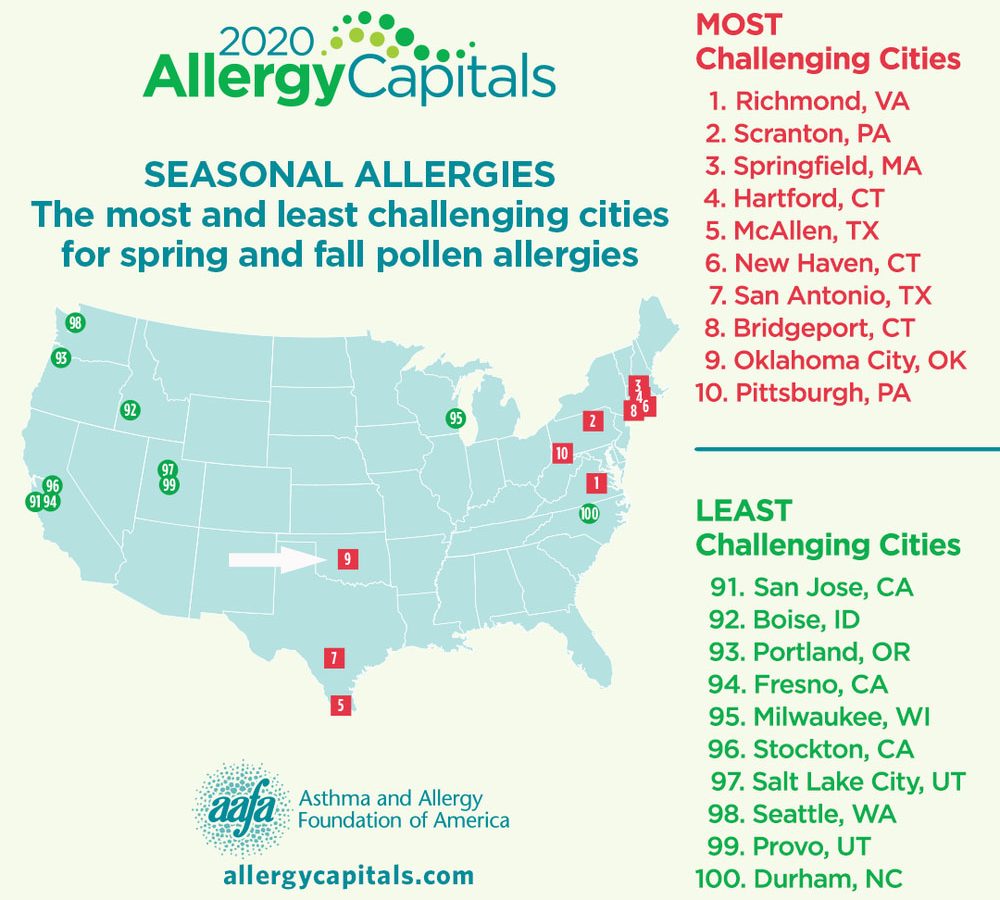The Asthma and Allergy Foundation of America (AAFA), the premiere patient advocacy organization representing more than 60 million Americans with asthma and allergies, just released its annual Allergy Capitals™ report for 2020. The report identifies the most challenging places to live with spring and fall allergies in the top 100 metropolitan areas in the U.S. Richmond, Virginia, takes the top spot based on higher-than average spring and fall pollen scores, higher-than-average medication usage and availability of board-certified allergists in the area. The top 10 Allergy Capitals for 2020 are:
1.Richmond, Virginia 2. Scranton, Pennsylvania 3. Springfield, Massachusetts 4. Hartford, Connecticut 5. McAllen, Texas 6. New Haven, Connecticut 7. San Antonio, Texas 8. Bridgeport, Connecticut 9. Oklahoma City, Oklahoma 10. Pittsburgh, Pennsylvania. Tulsa was named 23rd.
“For more than 50 years, the prevalence of allergic diseases has risen and it’s no coincidence that during the same time, pollen seasons have become stronger and longer due to warmer temperatures,” says Kenneth Mendez, AAFA CEO and president. “The Allergy Capitals report helps raise awareness about the impact of seasonal allergies, how people can prepare and start proper treatment. Local communities can also use the report as a tool to identify how to better meet the needs of their residents living with allergies and allergic asthma.”
Seasonal nasal allergies cause runny and congested noses, inflamed sinuses, relentless sneezing and other symptoms each spring through fall. Pollen can also trigger asthma attacks. Tree pollen season starts as early as January in some parts of the U.S. and continues through summer. In the fall, weed pollen – especially ragweed pollen – is responsible for symptoms. But relief is possible with the right treatment and by managing contact with pollen.
“You are not alone in dealing with allergies,” said Laura Chong, M.D., Oklahoma Allergy & Asthma Clinic Board-Certified Allergist. “Oklahoma City consistently remains in the top allergy and asthma capitals each year. You can take steps to limit your exposure to seasonal allergens like pollen; however, it is impossible to avoid pollen completely. It’s important to talk to your allergist about an allergy treatment plan to keep your symptoms under control.”
Treatment options can include over-the-counter or prescription allergy medicines. Allergy immunotherapy can help reduce or prevent allergy symptoms. These treatments are most effective if they are started before the allergy season begins.
See the full 100-city ranking at allergycapitals.com. The report lists overall rankings and breaks down a seasonal ranking for spring and fall. Watching daily pollen and mold reports can help those who are pollen allergic plan their day and make sure they are taking their medications.
A board-certified allergist can diagnose allergies, and determine the specific triggers that cause them, through simple tests. The allergists at Oklahoma Allergy & Asthma Clinic evaluate and manage patients of all ages. The main clinic is on the Oklahoma Health Center campus. For patient convenience, satellite offices are located in Edmond, Norman, Midwest City and Yukon.
Visit the OAAC website at www.oklahomaallergy.com to view the addresses for all Oklahoma Allergy and Asthma Clinic locations. To make an initial appointment for an allergy or asthma or to request more information, please call (405) 235-0040 or visit the website.

